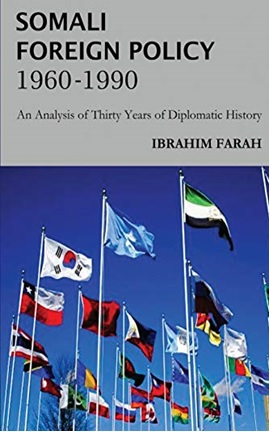Reviewed by: Abdirahman A. Issa
Author: Ibrahim Farah
Publisher: Adonis & Abbey Publishers Ltd
Pages: 202
Publication date: 2020
Somali foreign policy received less scholarly attention. Ibrahim Farah’s book is a welcome attempt to write the history of Somali foreign policy from 1960 to 1990. This book, which began as a Ph.D. thesis for Nairobi University, explores the application of state behavior theories to Somali foreign policy from 1960 to 1991.

The book addresses an important aspect of Somali history by connecting this issue to the civil war and conflicts that arose after the state collapse. Ibrahim emphasizes the need for policy-oriented academic research in this area, as foreign policy behavior is often overlooked as a contributing factor to regional conflict. Thus, this book makes a valuable contribution to both academically and to policymakers.
Foreign Policy As a Driver of Conflict
Ibrahim analyzes the impact of foreign policy on Somalia’s armed conflict. He investigates the theoretical connections between foreign policy and conflict while assessing the role of foreign policy in driving conflict in Somalia and the Horn of Africa. He argues that the international and internal conflicts that Somalia experienced between 1960 and 1990 were due to foreign policy choices, behavior, and orientation.
The main argument of this book is that Somalia’s foreign policy, centered on its pursuit of a ‘Greater Somalia’ and neighboring states’ containment policies, played a significant role in fueling armed conflicts within Somalia. In addition, he highlights other salient factors, such as colonial legacy, Somali nationalism, and Cold War politics, that contributed to the rise of armed conflict.
Foreign Policy Approaches and Decision-Making Process
Ibrahim notes that civil and military governments had differing approaches to the unification of greater Somalia. While the first two Somali civilian administrations sought diplomatic solutions, Barre opted for military intervention to reclaim missing territories. Regarding decision-making, Ibrahim stresses that Somalia practiced a parliamentary system of government with three branches that imposed limitations on decision-making for nine years after independence. However, under Barre’s rule, he asserts, foreign policy decisions were made at the president’s discretion. Top politburo members were consulted on specific issues, but the president’s authority prevailed.
Diplomatic Isolation
From 1960 to 1990, Ibrahim shows how Somali’s foreign policy aimed to achieve self-determination for all Somalis in the Horn of Africa led to diplomatic isolation. Unfortunately, this idea of a “Greater Somalia” was met with resistance from both within the region and beyond.
The OAU Charter and the 1964 OAU Cairo Resolution established the legitimacy of existing inter-state boundaries, which hindered Somalia’s efforts to expand its territory and ensured respect for other states’ sovereignty. In 1981, the OAU Summit reaffirmed Ethiopia’s sovereignty over Ogaden region, which further isolated Somalia politically.
Neighboring Countries’ Foreign policies toward Somalia
Ibrahim assesses the foreign policies of neighboring countries toward Somalia. As the host of the OAU, Ethiopia gained significant influence and support from African countries to contain Somali irredentism. On the other hand, Kenya resisted and defended itself against Somali irredentism, despite the desire of Kenyan-Somalis to secede.
Djibouti maintained neutrality by fostering friendly relations with both Somalia and Ethiopia. Ibrahim claims that Ethiopia has resisted the re-emergence of a powerful, self-governing Somalia for almost thirty years due to concerns about a resurgence of irredentist aspirations. Former Kenyan President Daniel Arap Moi has affirmed this apprehension, citing skepticism in the region regarding consolidated Somalia’s expansionist goals as a hindrance to achieving peace in Somalia.
The demise of the pan-Somali cause
Ibrahim contends that the defeat of Somalia in the Ogaden War with Ethiopia marked the end of the dream of a pan-Somali cause. According to Ibrahim, the dream has also been buried by Djibouti’s independence and Barre’s renouncement of the NFD.
Subsequently, Barre and Mengistu held a meeting in April 1988 in Djibouti, where they signed a peace agreement and re-established diplomatic relations, which was seen as a betrayal of the pan-Somali cause.
Foreign Policy and the Collapse of the State
While many studies of conflict in Somalia concentrate on the state collapse and war since 1991, Ibrahim notes that it is important to recognize the country’s involvement in several battles before this period. This includes the ‘Shifta wars’ in northeastern Kenya during the 1960s and the Ogaden War with Ethiopia from 1977-78. He argues the state collapse was the result of Somalia’s Foreign Policy.
The pan-Somali ideology ultimately proved to be Somalia’s downfall. The Ethiopian government’s decision to provide military bases to rebel groups has led to the overthrow of the military government. The government, led by Barre, used the pan-Somali sentiments to suppress domestic opposition and maintain its grip on power. Repression was the primary tool used by the military government to quell any dissenting voices.
The government also used pan-Somali rhetoric to distract the population from the country’s internal problems. The failure to unify the different clans led to bitter rivalries, which ultimately caused the collapse of the state.
Conclusion
While the book successfully made the transition from a dissertation to a published work, at times, it appears to be repetitive.However, the book makes a noteworthy contribution to the history of the Horn by bringing a unique perspective to the forefront. The author is also bold enough to make the assertion that Somali’s Foreign Policy played a key role in sparking conflict in the region.
Ibrahim’s book is a valuable addition to the limited literature on Somali’s foreign policy, offering insights that will benefit both foreign policy decision-makers and scholars, especially those interested in the Horn of Africa region.
Abdirahman A. Issa
Email: Cadced99@gmail.com
___________
Abdirahman A. Issa is a researcher of Somali History, culture, society and politics. His interests also include governance and development in fragile and post conflict contexts.

Leave a Reply